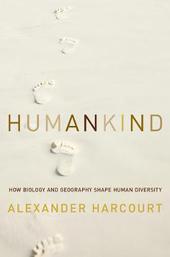
|
Humankind: How Biology and Geography Shape Human Diversity
Hardback
Main Details
| Title |
Humankind: How Biology and Geography Shape Human Diversity
|
| Authors and Contributors |
By (author) Alexander H. Harcourt
|
| Physical Properties |
| Format:Hardback | | Pages:368 | | Dimensions(mm): Height 236,Width 160 |
|
| Category/Genre | Human biology
Human geography
Social impact of environmental issues |
|---|
| ISBN/Barcode |
9781605987842
|
| Classifications | Dewey:304.2 |
|---|
| Audience | | Professional & Vocational | |
|---|
|
Publishing Details |
| Publisher |
Pegasus Books
|
| Imprint |
Pegasus Books
|
| Publication Date |
31 May 2015 |
| Publication Country |
United States
|
Description
Where did the human species originate? Why are tropical peoples much more diverse than those at polar latitudes? Why can only Japanese peoples digest seaweed? How are darker skin, sunlight, and fertility related? Did Neanderthals and Homo Sapiens ever interbreed? In Humankind, U. C. Davis professor Alexander Harcourt answers these questions and more, as he explains how the expansion of the human species around the globe and our interaction with our environment explains much about why humans differ from one region of the world to another, not only biologically, but culturally. What effects have other species had on the distribution of humans around the world, and we, in turn, on their distribution? And how have human populations affected each other's geography, even existence? For the first time in a single book, Alexander Harcourt brings these topics together to help us understand why we are, what we are, where we are. It turns out that when one looks at humanity's expansion around the world, and in the biological explanations for our geographic diversity, we humans are often just another primate. Humanity's distribution around the world and the type of organism we are today has been shaped by the same biogeographical forces that shape other species.
Author Biography
Alexander H. Harcourt is Professor Emeritus in the Anthropology Department at the University of California, Davis. He is the coauthor of Gorilla Society and Human Biogeography and co-editor of Coalitions and Alliances in Humans and Other Animals. He lives in Davis, California.
Reviews"Harcourt engages with the physical differences between human bodies and the cultural and medical implications of them, addressing such topics as why skin tone varies from region to region or the biological basis of why certain populations have evolved to better digest milk, starches, or seaweed. Harcourt reminds readers that biological conceptions of race should not be confused with sociopolitical conceptions of it, and that there are good reasons to understand the how and why of our biological differences." -- Publishers Weekly "A remarkable achievement." -- Science (Praise for Alexander Harcourt) "As sweeping and engrossing as they come. Keeping the science of the subject front and center, Harcourt airs the major differences of scientific opinion about particular developments. Gripping and then some." -- Booklist (starred review) "A dense but lucid summary of everything you would want to know about human diversity. Homogenization is inevitable, but we are an extraordinarily varied species today, and Harcourt delivers an opinionated but always science-based account of how we got that way." -- Kirkus Reviews "Lucid, fascinating, compelling and comprehensive. The analysis of complex evolutionary forces that shape a society is superb." -- Wildlife Conservation Society "Reaches far beyond origin to offer a complex yet highly readable account of our evolution in relation to biology, geography, and culture. Harcourt presents a concise explanation of adaptations made by the human species allowing for survival on a global scale. Recommended for readers interested in evolutionary biology, biogeography, anthropology, and human origin; also for those who have enjoyed works by Jared Diamond." -- Library Journal "Harcourt bridges the gap between biology and anthropology. A valuable contribution." -- Quarterly Review of Biology
|